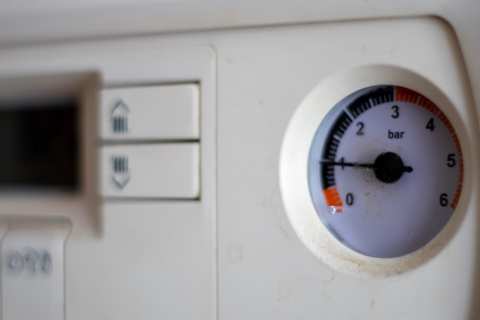How to reduce boiler pressure in your central heating system
Boilers are often taken for granted and when they break it can be pretty high pressure to get it fixed. So when your boiler pressure is too high you really need to be able to fix it.
Nearly everyone has a boiler at home. However, not all people know how to lower the boiler pressure. This is for the simple reason that many people don’t understand how a boiler works but it is easy to read a boiler pressure gauge and find out.
Why should I lower boiler pressure?

The boiler regulates the central heating system by using water. However, the boiler must be operating properly if it is to work correctly. It is important to maintain the ideal boiler pressure at the correct level.
This will not only save you money but it also makes your boiler more efficient. Sometimes, however, the boiler’s pressure gauge can rise above its optimal level, which can lead to unwelcome problems. We will examine the boiler’s operation and how to lower the pressure to prevent major problems.
However, If you find your boiler losing pressure every day, it could be due to a leak coming from the boiler, check for any error codes that may appear.
What does high boiler pressure mean?
Boiler pressure, in simple terms, refers to the equilibrium between air and water within a central heating system. This is not the same as water pressure, which refers to running water.
Your boiler must be working properly if it is to function at its best. It cannot be set too low or too high. Your central heating system may stop working if the boiler pressure drops too low. It may even shut off completely. The boiler pressure can also be too high and cause the system to fail.
What causes high boiler pressure
There could be many reasons your boiler is leaking high pressure. You should be aware that your boiler pressure will naturally rise when you heat or use hot water.
These spikes can cause a rise in pressure, but they are not abnormal and you shouldn’t panic. However, it is not normal for the pressure to exceed 2.5 bar. Your boiler may have a problem such as a faulty pressure relief valve if the pressure is constant between 2.5 and 4 bar.
Is high boiler pressure dangerous?
High boiler pressure can be dangerous in older boilers or at least cause leaks in pipework, but most new boilers will just shut down High pressure in a boiler can be caused by too much water. This is usually caused by high boiler pressure after the boiler pressure was adjusted to a lower level.
If you are getting a leak then it is best t check the pressure first. If you have an old conventional system you may need a tundish.
It is possible that the filling valve or loop used to pump water into the boiler was accidentally left open. This is usually located at the bottom of the boiler. Make sure you close it tightly. A leaky valve, or a faulty part could also cause high pressure.
How to lower your boiler pressure
It is easy to lower your boiler pressure. It’s as easy as bleed your radiators. This will reduce the pressure in your central heating system which, in turn, lowers the boiler pressure.
If you don’t have one, you will need a key to turn the radiator on. Make sure the boiler is at its lowest temperature before you start bleeding. This is a safety precaution to ensure you don’t get burned by hot water.
How to fix boiler pressure too high – easy steps
Locate the release valve for your radiator. It is usually located on the top of your unit. Next, use your radiator key to turn the valve slowly to release air from radiator. To prevent water from leaking, keep a container and a towel or cloth nearby.
Once you are certain that the bleeding has been completed successfully and that there is no liquid or air being released from the radiator, you will begin to notice that the boiler pressure starts to drop back to normal.
You can see that reducing boiler pressure doesn’t have to be difficult if you understand the basics. It is a good idea to check the pressure reading on your control panel every so often. High boiler pressure can lead to boiler failure. If it is above 2.5 bars, the problem may be serious.
In such situations, the first thing to do is check that your boiler valve or filling loop is sealed. This is because high boiler pressure is common. Next, you should bleed the radiator to bring down pressure to normal operating levels. If that fails, you can call a Gas Safe Registered engineer. They can identify the problem and correct it safely.
boiler pressure too high and leaking

When a boiler’s pressure is too high and leaking, it can be a few potential issues that require attention. High pressure in a boiler system can result from various factors such as a faulty pressure relief valve, a malfunctioning expansion vessel, or an overfilled system. The presence of leaks further compounds the problem and can lead to water damage and inefficient operation.
Bleeding My Radiator didn’t work, what now?
If bleeding radiators didn’t work, just check that it isn’t low boiler pressure that is causing you the issues now as even if you topped the water pressure back up, it can still take a while to settle in most central heating systems.
If the radiator is not bleeding, it could be a problem with another component. There could be a problem with your pressure gauge, or an internal component such as the expansion vessel or pressure relief valve.
To ensure that the job is done correctly, such tasks should only be performed by qualified engineers. The next step is to visit the Gas Safe Register. This register contains all registered engineers from the UK, Isle of Man, and Guernsey who are legally authorized to perform gas work. You can easily locate a qualified engineer near you by browsing the site.
Is your boiler pressure too high still?
If you can see your boiler pressure rising. It is important that you don’t attempt any maintenance work on your boiler yourself without the assistance of a professional. Your warranty won’t cover you and you could endanger your safety. You can’t use any gas appliance that is unsafe. It’s always better to be safe than sorry.
If you have an older boiler, pressure can start to cause you much more issues than modern boilers. If your boiler is over 10 years old we strongly recommend a new boiler as they are much more energy-efficient and can be much more economical than paying for a boiler repair every month or so. If you call a Gas Safe engineer more than twice a year, then why not get a fixed price quote online now